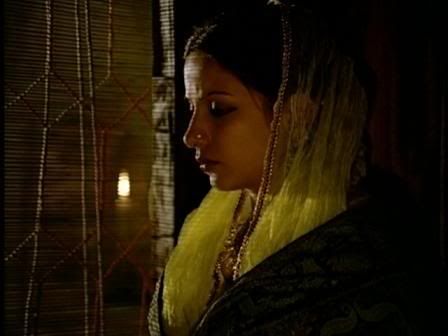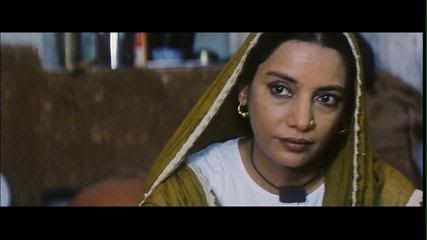Geek's guide to Shabana Azmi, part 2 - cog in a brilliant machine
Welcome to the second chapter of the Geek's Guide to Shabana Azmi - Cog in a Brilliant Machine. To read more about the Geek's Guide check out the Introduction and Part 1 - Iconic Roles. 
COG IN A BRILLIANT MACHINE
This category is for outstanding films in which Shabana ji's character was not the focus of the story. Some are ensemble films that have no single central character; in others, Shabana ji had more of a supporting role - but they are all fabulous, excellent films, among my favorites.
Amar Akbar Anthony (1977). Three guys, three girls, and all sorts of syncretic symbolism, wrapped up in a rollicking masala package. Our girl had the least screen time of the six principals, but it's not easy to forget her hitching a ride with Vinod Khanna and giving him the hard sell, or taking in the laundry in the scene of domestic bliss in the one little piece of a song that is picturized on her. It's a role that certainly could have been played by just about anyone, but it doesn't matter, since it's a great film that should be seen regardless.
Parvarish (1977). Not quite up to the standard of masala genius set by Amar Akbar Anthony, Parvarish makes up for being a slightly weaker film by offering a much more generous helping of Shabana ji, who here has nearly full co-heroine status. And if you want to see young , raw proto-Shabana trying on the avatar of masala heroine, Parvarish (or the equally trippy Fakira, in which she is the lead heroine) is where you should turn. She plays a pickpocket and small-time con artist named Shabo who, together with her sister Neetu (Neetu Singh of course) set out to mend their ways and win the love of their respective heroes - Vinod Khanna and Amitabh Bachchan - twirling exuberantly through some of the wackiest songs you'll ever see.
Shatranj ke khilari (1977). Shabana ji has played many a neglected wife in her career, but only in Satyajit Ray's lovely little multi-layered fugue on the sunset of the Mughal imperial tradition is she neglected in favor of a game of chess. It's a small role but a terrifically bitter one, as she attempts ever more drastic gambits to win back her husband's attention. My teacher described this role as one of the "hottest" of Shabana ji's career, and I think it fits - hot-headed, hot-blooded, and smoking hot.
Junoon (1979). As in Shatranj ke khilari, Shabana ji plays a neglected Awadhi wife in this smashing, gritty film by Shyam Benegal; but the similarities end there. Her character is dark, intense, wounded, angry, and nearly powerless, as she attempts to manage her rage when her husband (Shashi Kapoor) proposes to make a second wife out of the young Anglo girl who is his obsession. Her attempts to regain control of her marriage are compelling, and her final scene in the film is bitterly heartbreaking.
Khamosh (1985). This light thriller by Vidhu Vinod Chopra is one of my favorite of Shabana ji's films. Apart from being a great whodunit story, it pokes fun at filmi conventions and screws around with the viewer's sense of reality in some delightful ways. It takes place on the set of a film that stars Amol Palekar, Soni Razdan, and Shabana Azmi - the three actors play themselves, and it's clear they've done so with a healthy sense of humor. The Khamosh version of Shabana Azmi jumps up and down like a schoolgirl when she learns that she's won another National Film Award. She also sleepwalks, reads about herself in gossip magazines, and declares "I don't understand politics."
Dharavi (1992). Shabana ji plays a frustrated and complex woman in Sudhir Mishra's excellent look at daily life in the slums of Bombay. The focus of the story is on her husband, played Om Puri, but her subplots add texture and, in their contrast to Om Puri's character's big dreams and schemes, illuminate some of the quotidian aspects of slum life - fighting for water, working in a sweatshop. It's a sensitive film and she gives a delicate performance - also (on a shallower note) looking her best.
Mrityudand (1997). This is simply a fantastic film. It is primarily Madhuri Dixit's show, and Shabana ji's character - yet another neglected wife - doesn't really get going until the second half. But it's well worth waiting for, as it includes a steamy affair, a defiant verbal smackdown of her husband, a nd even a wet sari scene (!). Shabana ji's climactic scene carries interesting parallels to the climax of the contemporaneous Fire; each is a burst of measured rage from a woman who, after a long life of unquestioning submission, has discovered her autonomy (particularly sexual autonomy). And it's a top-notch film all around.
Hari-bhari (2000). More excellent Shyam Benegal, Hari-bhari presents episodic but intertwining stories about the repercussions of fertility (or its absence) on five women in a Muslim family. Shabana ji's character is more an abused wife than a neglected one, tossed out of her home when she dares, on the advice of her doctor, to suggest to her husband that her difficulty having a son may be due to his deficiency rather than hers. Other stories touch on marriage and sexuality, contraception and religion, and education for women. Shabana ji's character is sad and nearly broken, but there's a streak of fight left in her and she's determined to craft a more autonomous life for her teenage daughter. In one of her standout scenes, she misinterprets the girl's innocent questions and mistakenly concludes - to her horror - that her daughter is pregnant.
15 Park Avenue (2005). I wavered on where to put this film, as it is flawed, and I don't love it as much as the other films in this category. But Shabana ji is great in it, and so is Konkona Sen Sharma - to the extent the weaknesses in the script allow them to be - so here it is. Besides, Shabana ji's character is a physicist; how can I not love that? Hearing that voice lecturing on quantum mechanics - the domain of my previous career - sends shivers up my spine. And it's an interesting character for Shabana ji to play - she's strong and formidable, yet also flawed and damaged, a bitter control freak who cannot manage a personal relationship.
Honeymoon Travels Pvt. Ltd. (2007). This is a delightful, adorable film, and Shabana ji plays a great character with a tragic past and a grounded present. Her character (together with Boman Irani's character) provides an anchor for the movie's light-hearted tone, bringing the gravity of life experience to the ensemble cast, but with enough warmth and humor that the weight isn't unbalancing. She's placid, wry, kind-hearted, and a leader by example - and she dances, too!


2 comments:
I have only seen the first and last films on this list, and I loved them both. In AAA, although Shabana Azmi did have the smallest part of the six leads, she definitely made her presence felt, from her very first scene. And she looked lovely opposite Vinod Khanna - especially in the gorgeous black-and-white print sari she wears at some point... I loved her opposite Boman in 'Honeymoon Travels' - some of my favourite moments in that film are the ones with her crying in the bathroom, in bed with the step-daughter (sounds wrong, but you know what I mean), and of course dancing. And there was the cute kiss as well. I hope to see more of these films... I've been stalking 'Parvarish' for eons but it always seems to elude my grasp... and is 'Shatranj ke Khilari' the same film as 'The Chess Player'? I found a Satyajit Ray film with the latter name somewhere...
DG: *Shatranj ke khilari* is indeed sometimes referred to by its translated title, "The chess players."
About AAA - even at that early point in her career, I think Shabana ji had the instincts of a star. I remember reading in a biography of Ingrid Bergman that when she was an extra in some production or other she took care to make sure her face was always fully visible to the camera. I think Shabana ji applied some of the same philosophy to her brief turn in AAA. She said that she designed her own dress for the climactic scene - her bridesmaids dress - and added all the jasmine flowers to it because she didn't want to be upstaged by Parveen Babi in the wedding dress.
Post a Comment